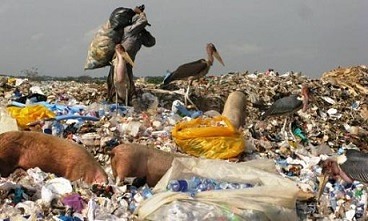Food Waste and Hunger Side by Side - Scandalous!

Pigs, marabou storks and human scavengers compete for food waste
at Dandora dump on the outskirts of Nairobi. (Photo: AlertNet)
"Waste not, want not." - How does the human race measure up to this wise saying when it comes to one of the essentials of life, food?
Not well, it seems. Research by the Institution of Mechanical Engineers, reported in the Guardian, found that between 30% and 50% of all the food produced in the world, equivalent to 1.2 to 2bn tonnes, never makes it to a plate and ends up as waste every year. Reasons for this colossal waste are given:
“Unnecessarily strict sell-by dates, buy-one-get-one free and western consumer demand for cosmetically perfect food, along with poor engineering and agricultural practices, inadequate infrastructure and poor storage facilities…In the UK as much as 30% of vegetable crops are not harvested due to their failure to meet retailers' exacting standards on physical appearance, while up to half of the food that is bought in Europe and the US is thrown away by consumers.”
A report by the Food and Agriculture Organization (FAO) of the United Nations estimates that per capita food waste in the US and northern Europe is 95-115 kg/year while in sub Saharan Africa and south/south East Asia it is 6-11 kg/year. What a scandalous waste of resources! Lest we forget, the energy needed to produce and distribute this staggering amount of wasted food comes overwhelmingly from burning fossil fuels, with greenhouse gas emissions exacerbating global warming.
Obesity in the UK and US is reaching epidemic levels mainly due to poor diet. Nutritionists and doctors tell us that for good health we should eat more fruit and vegetables, the five-a-day campaign. Yet we find our supermarkets are rejecting good nutritious fruit and vegetables for cosmetic reasons. Because of this enormous waste, these essential foods are very expensive in our supermarkets, which puts them beyond the reach of many poor families. Couldn’t our supermarkets provide the space to sell these rejects at lower prices for those of us who don’t mind less than perfect shape and colour for their fruit and vegetables?
If not, then surely here is a business opportunity for someone to take supermarket rejects directly from the growers and sell them at affordable prices, in so doing improving the health of large numbers of people, and saving the National Health Service a fortune.
Contrast the above figures on food waste with these statistics: in 2010-12 there were 868 million undernourished people worldwide. The effect of such hunger on children is tragic and could be avoided. Here are the UNICEF figures:
“More than 2 million children die every year because they can’t get enough to eat. Millions more live with physical disabilities or learning difficulties because their growth has been stunted by lack of food… About 180 million children under the age of five suffer from stunting and are not reaching their potential.”
In the UK, the services of foodbanks are becoming increasingly vital in providing a lifeline to people going hungry. There is extreme pressure on poor families’ budgets due to austerity and cuts, with expectations that the situation will worsen when cuts to the welfare safety net begin to bite. Trussel Trust foodbanks fed 128,687 people nationwide in 2011-12 with the figures anticipated to more than double in 2012-13.
The US and Europe have the technical knowhow to help the developing world reduce their food waste. The FAO report summarizes the problems:
“Food losses and waste in low-income countries are mainly connected to financial, managerial and technical limitations in harvesting techniques, storage and cooling facilities in difficult climatic conditions, infrastructure, packaging and marketing systems.”
Of course there are many charities that are doing excellent work in these areas, in many cases hindered by corruption and war. It is enlightened self interest to help those countries with technical help, and the supply of tools and machines. It would give a boost to British industry to help it recover from the economic recession, and move it towards manufacturing and engineering, essential for providing good well-paid jobs.
In the industrialized west we need only a change in the way we think about food to reduce appreciably the waste. In the developing world the problems are more complex, but the west can help and in so doing help our economies. Here is an idea for the UK: how about using some of the £375bn pumped into the banks under Quantitative Easing to do just that; in the US the equivalent figure is $2.3tn. I bet that would be far more effective than stuffing it into the banks.
___________________________________________________________________________________
Dr Adnan Al-Daini took early retirement in 2005 as a principal lecturer in Mechanical Engineering at a British University. His PhD in Mechanical Engineering is from Birmingham University, UK. He has published numerous applied scientific research papers covering heat transfer, fluid flow and energy utilization in many industrial applications. He is a British citizen born in Iraq. Since retirement he has devoted his time and energy to building bridges and understanding between minority communities, particularly the Muslim community and the wider community in the South West of England. He was Chair of Devon Racial Equality Council between 2007/8. Adnan is a contributing writer for the Huffington Post.
___________________________________________________________________________________
Article also posted here: Huffington Post.
URL: http://www.a-w-i-p.com/index.php/2013/04/23/food-waste-and-hunger-side
























